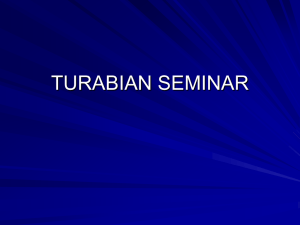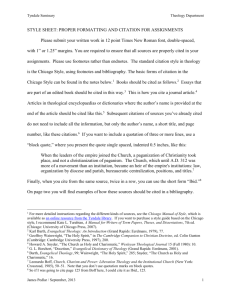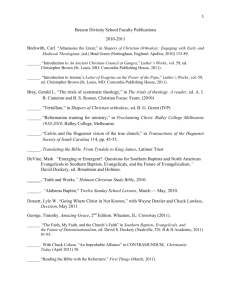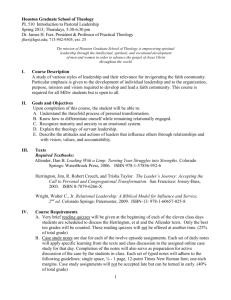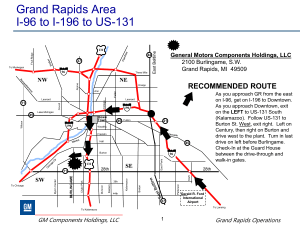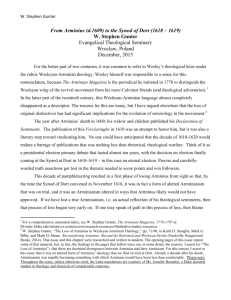History of Christianity 2 Abilene Christian University, Graduate
advertisement
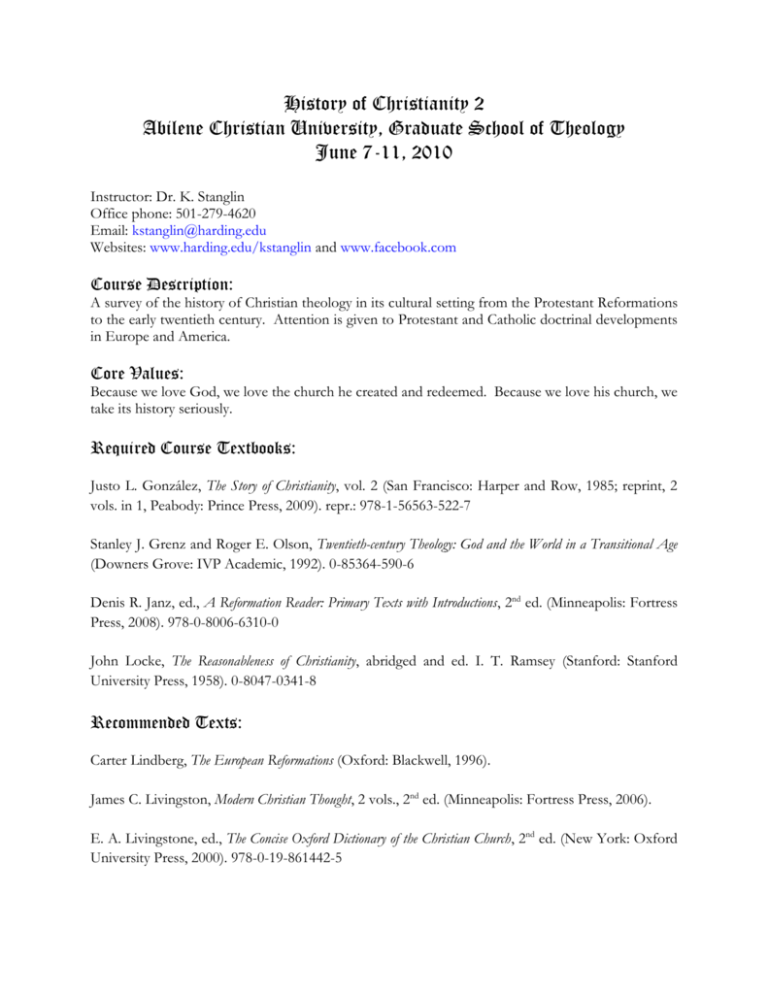
History of Christianity 2 Abilene Christian University, Graduate School of Theology June 7-11, 2010 Instructor: Dr. K. Stanglin Office phone: 501-279-4620 Email: kstanglin@harding.edu Websites: www.harding.edu/kstanglin and www.facebook.com Course Description: A survey of the history of Christian theology in its cultural setting from the Protestant Reformations to the early twentieth century. Attention is given to Protestant and Catholic doctrinal developments in Europe and America. Core Values: Because we love God, we love the church he created and redeemed. Because we love his church, we take its history seriously. Required Course Textbooks: Justo L. González, The Story of Christianity, vol. 2 (San Francisco: Harper and Row, 1985; reprint, 2 vols. in 1, Peabody: Prince Press, 2009). repr.: 978-1-56563-522-7 Stanley J. Grenz and Roger E. Olson, Twentieth-century Theology: God and the World in a Transitional Age (Downers Grove: IVP Academic, 1992). 0-85364-590-6 Denis R. Janz, ed., A Reformation Reader: Primary Texts with Introductions, 2nd ed. (Minneapolis: Fortress Press, 2008). 978-0-8006-6310-0 John Locke, The Reasonableness of Christianity, abridged and ed. I. T. Ramsey (Stanford: Stanford University Press, 1958). 0-8047-0341-8 Recommended Texts: Carter Lindberg, The European Reformations (Oxford: Blackwell, 1996). James C. Livingston, Modern Christian Thought, 2 vols., 2nd ed. (Minneapolis: Fortress Press, 2006). E. A. Livingstone, ed., The Concise Oxford Dictionary of the Christian Church, 2nd ed. (New York: Oxford University Press, 2000). 978-0-19-861442-5 Richard A. Muller, Dictionary of Latin and Greek Theological Terms: Drawn Principally from Protestant Scholastic Theology (Grand Rapids: Baker Book House, 1985). Williston Walker, et al., A History of the Christian Church, 4th ed. (New York: Charles Scribner’s Sons, 1985). Course Requirements: 1. Reading of assigned texts and class participation (25 pts.). You are expected to complete all assigned readings prior to the class meetings. Many readings will be available online. Print, read, and bring them to class with you. The lectures, which will not recapitulate the textbooks, will assume that you have read the assignments and know the material. Be prepared to take notes, discuss, and answer questions about the reading material in class. At the end of the course, you will be asked to sign a statement indicating how much you have read. 2. Mid-week exam (25 pts.). A brief, objective exam on Wednesday morning will assess your grasp of the first two days of reading and lecture material. 3. “Past and present” paper and presentation (25 pts.). Write a reflection paper that puts the content learned this week to practical use in addressing issues or problems in the church today. Focus on an event or thinker or controversy from the past, and show how this knowledge can help the church today. The goal is to give concrete evidence of how “historical perspective” is beneficial, how knowing the church’s history can help the present-day church move forward. This paper is to be your own individual work, and should not require any outside research. It should demonstrate a clear knowledge of the historical aspect as well as insightful reflections and observations on real current issues. It should offer general principles illustrated by specific examples, past and present. It should be single-spaced, and at least 1,000 words. It is due when you come to class on Friday morning. Be prepared to give a six- to eight-minute presentation of this material on Friday. 4. Final exam (100 pts.). The final exam will be a take-home, open-note exam that should be done individually. Completed exams should be scanned and emailed to the professor; or copied and mailed to Keith Stanglin, c/o H. Henry Meeter Center for Calvin Studies, Hekman Library, 1855 Knollcrest Circle SE, Grand Rapids, MI 49546, postmarked by 5:00 p.m., Friday, June 25. Late exams will be penalized 10% per day late. 5. Research paper (100 pts.). The student will submit a research paper on an approved topic. Topics must be approved by Friday, June 18. Students are also encouraged, but not required, to submit a prospectus that includes a) a statement of the problem to be investigated, b) an indication of the approach to be adopted, and c) a preliminary bibliography. The paper should be 10-15 pages in length (double-spaced) and should carefully follow Turabian style. The final draft of the paper should be emailed to the professor by or before 5:00 p.m., Monday, July 26, to be considered on time. Late papers will be penalized 10% per day late. Grading Scale: 90-100% = A 80-89 = B (“Good”) 70-79 = C (“Average”) 60-69 = D 0-59 = F Meeting Times: June 7 Morning lectures, 8:00-12:00 Afternoon lectures, 1:00-5:00 Evening lectures, 6:00-9:00 June 8-10 Morning lectures, 8:00-12:00 Afternoon lectures, 1:00-5:00 June 11 Final lectures, 8:00-1:00 Course Schedule: (Gonzalez readings are listed according to chapter numbers. Janz readings are listed by selection numbers. Grenz and Olson [GO] are listed by page numbers.) Monday, June 7 Session 1: Backgrounds of Reform Session 2: First Outbreak of Reform: Luther Session 3: Luther Documentary; Zwingli and the Radicals 1) Gonzalez 1-6 2) Janz 1-3, 5, 7-8, 10-14, 16-29, 31-38, 44, 47-61, 63-64 3) George Huntston Williams and Angel Mergal, eds., Spiritual and Anabaptist Writers, Library of Christian Classics, vol. 25 (Philadelphia: Westminster Press, 1957), 19-35, 71-85. 4) Keith Stanglin, “‘Faith Comes from What Is Heard’: The Reformers on the Ministry of the Word and the Holy Spirit,” Leaven 12/3 (2004): 161-66. Tuesday, June 8 Session 4: Calvin and the Codification of Reformation Doctrine Session 5: England, Roman Catholicism, and European War 1) Gonzalez 7-15 2) Karin Maag, “Review of Registres du consistorie de Genève au temps de Calvin Tome III,” Calvin Theological Journal 40/2 (2005): 362-64. 3) Janz 68-86, 88, 90-92, 94, 96-102, 105-08, 110-15, 117, 122 4) Council of Trent, “Session 22 (Doctrine and Canons),” and “Profession of Faith,” in Creeds of Christendom, ed. Philip Schaff (Grand Rapids: Baker, 1996), vol. 2:176-86, 207-10. 5) Guido de Bres, Belgic Confession, art. 1-16, available at http://www.reformed.org/documents/index.html?mainframe=http://www.reformed.org/docume nts/BelgicConfession.html 6) Heinrich Bullinger, Second Helvetic Confession, chs. 3, 6, 9-10, available at http://www.sacred-texts.com/chr/2helvcnf.htm Wednesday, June 9 Session 6: Arminianism and Protestant Orthodoxy Session 7: Enlightenment and Skepticism 1) Gonzalez 16-22 2) Zacharias Ursinus, Commentary on the Heidelberg Catechism, trans. G. W. Williard, Q and A 75-80 (Cincinnati: Elm Street Printing, 1888), pp. 377-424. Available at Google Books, http://books.google.com/books?id=hNpDAAAAYAAJ&ots=1eImxa3nJA&dq=ursinus%20comm entary%20on%20the%20heidelberg%20catechism&pg=PA377#v=onepage&q=&f=false 3) Keith Stanglin, “Arminianism,” in Global Dictionary of Theology, ed. William A. Dyrness and Veli-Matti Kärkkäinen (Downers Grove: IVP Academic, 2008), 61-63. 4) Jacob Arminius, Declaration of Sentiments, in The Writings of James Arminius, trans. James Nichols and W. R. Bagnall (Grand Rapids: Baker, 1956), vol. 1:211-55. Also available at Google Books, http://books.google.com/books?id=gJ89AAAAYAAJ&lpg=PA276&ots=6J6L9JFXz6&dq=armini us%20apology%20or%20defence&pg=PP1#v=onepage&q=arminius%20apology%20or%20defenc e&f=false 5) Jacob Arminius, Apology or Defence of James Arminius against Thirty-one Theological Articles, articles 22-31, in Writings of James Arminius, vol. 1:344-79. Also available at Google Books, http://books.google.com/books?id=gJ89AAAAYAAJ&lpg=PA276&ots=6J6L9JFXz6&dq=armini us%20apology%20or%20defence&pg=PP1#v=onepage&q=arminius%20apology%20or%20defenc e&f=false 6) Remonstrance of 1610, in Creeds of Christendom, ed. Philip Schaff (Grand Rapids: Baker, 1996), vol. 3:545-49. 7) Canons of the Synod of Dort (1619) (along with Rejection of Errors), available at http://reformed.org/documents/index.html?mainframe=http://reformed.org/documents/canons_ of_dordt.html 8) Richard A. Muller, “Was Calvin a Calvinist?” available at http://www.calvin.edu/meeter/lectures/Richard%20Muller%20%20Was%20Calvin%20a%20Calvinist.pdf 9) René Descartes, Discourse on Method, chapter 2, available at http://www.literature.org/authors/descartes-rene/reason-discourse/chapter-02.html 10) John Locke, The Reasonableness of Christianity, 7-20, 24-77. Thursday, June 10 Session 8: Pietist and Methodist Revival Session 9: Liberal Protestantism and Fundamentalist Critique 1) Gonzalez 23-30 2) Mark Noll, “Pietism,” available at http://mb-soft.com/believe/txc/pietism.htm 3) Philip Jakob Spener, Pia desideria (Philadelphia: Fortress Press, 1964), 87-122. 4) John Wesley, “A Short History of Methodism,” available at http://gbgm- umc.org/umw/Wesley/shorthistory.stm 5) John Wesley, “The Character of a Methodist,” available at http://new.gbgmumc.org/umhistory/wesley/character/ 6) John Wesley, “The Scripture Way of Salvation” (Sermon 43), available at http://new.gbgm-umc.org/umhistory/wesley/sermons/43/ 7) GO, 11-62 8) Friedrich D. E. Schleiermacher, “Sermon at Nathanael’s Grave,” in A Chorus of Witnesses: Model Sermons for Today’s Preachers (Grand Rapids: Eerdmans, 1994), 256-61. 9) Nathan Hatch, The Democratization of American Christianity (New Haven: Yale University Press, 1989), 3-46, 193-219. 10) Joseph Smith, “The King Follett Sermon” (part 1), available at http://www.lds.org/ldsorg/v/index.jsp?vgnextoid=2354fccf2b7db010VgnVCM1000004d82620aR CRD&locale=0&sourceId=1a79945bd384b010VgnVCM1000004d82620a____&hideNav=1 11) B. B. Warfield, “The Deity of Christ,” available at http://www.xmission.com/~fidelis/volume2/chapter10/warfield.php Friday, June 11 Session 10: Kierkegaard and Twentieth-century Theology 1) Gonzalez 31-36 2) GO, 63-199 3) Søren Kierkegaard, Practice in Christianity, trans. Howard Hong and Edna Hong, Kierkegaard’s Writings, vol. 20 (Princeton: Princeton University Press, 1991), 40-53. 4) Søren Kierkegaard, “Truth Is Subjectivity,” in Philosophy of Religion, 4th ed., ed. Michael Peterson, et al. (New York: Oxford University Press, 2010), 111-14. 5) “Resistance in Nazi Germany,” Barth and Bonhoeffer, in Henry Bettenson and Chris Maunder, Documents of the Christian Church, 3rd ed. (Oxford: Oxford University Press, 1999), 372-75. 6) Karl Barth, Evangelical Theology: An Introduction, trans. Grover Foley (Grand Rapids: Eerdmans, 1963), 15-59. 7) “Constitution of the World Council of Churches” (1948 and 1961), in Bettenson and Maunder, Documents of the Christian Church, 3rd ed. (Oxford: Oxford University Press, 1999), 426-27. Due Dates: Wednesday, June 9 Mid-week exam Friday, June 11 “Past and Present” Friday, June 18 Research paper topic and prospectus Friday, June 25 Final exam Monday, July 26 Research paper Reading Guidelines: Gonzalez, our secondary source, serves as a good introduction for those who have had no exposure to historical theology and as a good refresher for those already familiar with this period of Christian history. It provides a good sense of the major turning points in church history. The other main secondary source, Grenz and Olson, supplements Gonzalez and substitutes for primary reading in some relatively difficult material (e.g., Kant, Hegel, Schleiermacher, Tillich, et al.). The Oxford Concise Dictionary of the Christian Church, recommended for the course, is a great resource to have on the shelf for quick reference to (almost) all things theological. Primary sources, however, comprise the bulk of the course readings. The assumption behind this choice is that there is no better way to understand the major figures under discussion than to read large chunks of their own writings. Here are some general methodological guidelines. 1) The reader should primarily be attentive to the thesis or central idea of each reading selection. What main point is the author trying to get across? 2) The reader should discern how the author proceeds to support the thesis. How does the author support his case? What are his arguments? If it is readily available in the editorial note or introduction, the reader should keep in mind the occasion for writing and the intended audience, which help to illuminate the main idea and method of argumentation. 3) The reader should always be on the lookout for any relevant presuppositions, beliefs, values, and themes that illustrate the author's Sitz im Leben and that connect with his larger corpus and that of his contemporaries. 4) Finally, look for threads of influence that precede the author and for the seeds of theological trajectories that follow him. Whom does the author quote or seem to follow, and who later appeals to the author and seems to follow him? In other words, as in biblical studies, the best way to understand an author is to put one's exegetical skills to work. At the very least, this kind of reading will require annotating one's textbooks and photocopies, and perhaps taking separate notes on the readings. (In a short course, where most of the reading is done in advance, it would be beneficial to review one's notes each evening in preparation for the subsequent class period.) The goals for reading are threefold. As already stated, the primary proximate goal of the reading is to begin to understand the authors on their own terms, before making any judgments about their orthodoxy or heterodoxy. As Herbert Butterfield wrote, “Real historical understanding is not achieved by the subordination of the past to the present, but rather by our making the past our present and attempting to see life with the eyes of another century than our own.” Similarly, Etienne Gilson said, “It takes much more cleverness to understand a philosophy than to refute it.” Moreover, an understanding of the reading selections will increase the student's grasp of the class lectures, and vice versa. Accurate, descriptive understanding is requisite for and leads to fair evaluation, which is the remote goal of the reading. After understanding and basic evaluation, the question of how the material can inform our own faith and practice in a positive way should be addressed as the ultimate goal. What can be gained from this historical perspective? What have we learned about ourselves in the process? How does this material impact the theology and controversies of the present day and help the church move forward? Based on our understanding and evaluation, how can we be more faithful disciples, both individually and corporately, leading us to the eternal enjoyment of God? The more proximate the goal, the more attention will be given to it during class meetings. Nevertheless, each of the three goals, though distinct, should never be pursued in isolation from the others. Note well that getting a good grade was not listed as a goal for the reading. In an academic institution, however, grades must be assigned, and a good grade, though not a goal per se, should rightly flow from and reflect the student's clear understanding of the readings (as well as the lecture material). In light of this necessity, the professor's assessment of a student's grasp of the readings will be based both on classroom discussion, where students will be required to participate in conversations based on the readings, and on the two examinations. Paper Suggestions: Research papers should be historical in nature, dealing with the time period covered in the course (ca. 1300 to present). As such, they should demonstrate a healthy dose of primary source research along with secondary sources. The best topic is one that interests you. After doing (or glancing through) the readings, what strikes your fancy? a) You may examine a particular thinker, idea, or event of church history. Of course, you will need to make sure your topic’s scope fits the desired length of the paper. Combine a group or thinker with a doctrine or event. The following topic suggestions are not meant to limit your selection, but to get the intellectual juices flowing. Other suggestions are welcome. Some groups to consider: Roman Catholic, Eastern Orthodox, Lutheran, Anabaptist, Reformed, Arminian, Socinian, Pietist, Evangelical. For individual figures, see primary readings and textbook indices. Ideas, doctrines, events: Canon of Scripture Biblical interpretation Sin and anthropology Christology Church organization Missions Persecution The state church Church councils Identification and treatment of heretics Baptismal theology and practice Eucharistic theology and practice Popes Predestination Early reform efforts Confessionalization Thirty-Years’ War Enlightenment Impact of philosophy on theology Christian interaction with other religions Ecumenical movement b) Or…You may discuss the impact of church history on a particular area of life, church, art, family, worship, or confessions and catechisms, etc. You may trace the influence of a particular thinker, event, or doctrine. I want to know how church history impacted a particular area of life of interest to you. Church History Select Bibliography1 I. Reformation/Post-Reformation: Bagchi, David and David C. Steinmetz, eds. The Cambridge Companion to Reformation Theology. Cambridge, Eng.: Cambridge University Press, 2004. Bangs, Carl. Arminius: A Study in the Dutch Reformation. Nashville: Abingdon, 1971; reprint, Eugene, OR: Wipf and Stock, 1998. Chadwick, Owen. The Reformation. The Penguin History of the Church 3. New York: Penguin Books, 1964. Estep, W. R. The Anabaptist Story: An Introduction to Sixteenth-Century Anabaptism. 3rd ed. Grand Rapids: Eerdmans, 1996. Greef, Wulfert de. The Writings of John Calvin: An Introductory Guide. Expanded ed. Trans. Lyle D. Bierma. Louisville: Westminster John Knox Press, 2008. Hillerbrand, Hans J. The Division of Christendom: Christianity in the Sixteenth Century. Louisville: Westminster John Knox Press, 2007. Lindberg, Carter. The European Reformations. Oxford: Blackwell, 1996. Muller, Richard A. Post-Reformation Reformed Dogmatics. 4 volumes. Grand Rapids: Baker Book House, 2003. Oberman, Heiko A. The Dawn of the Reformation: Essays in Late Medieval and Early Reformation Thought. Grand Rapids: Eerdmans, 1992. . The Impact of the Reformation. Grand Rapids: Eerdmans, 1994. . Luther: Man between God and the Devil. New Haven: Yale University Press, 1989. O’Malley, John W., ed. Catholicism in Early Modern Europe: A Guide to Research. St. Louis: Center for Reformation Research, 1988. The Oxford Encyclopedia of the Reformation. 4 vols. Ed. Hans J. Hillerbrand. New York: Oxford University Press, 1996. Ozment, Steven. Age of Reform: 1250–1550. Yale University Press, 1980. . The Reformation in the Cities: The Appeal of Protestantism to Sixteenth-Century Germany and Switzerland. New Haven: Yale University Press, 1975. For my more extensive introductory bibliography of English-language secondary sources on historical theology, visit http://www.harding.edu/kstanglin/bibliography.htm 1 Stanglin, Keith D. Arminius on the Assurance of Salvation: The Context, Roots, and Shape of the Leiden Debate, 1603–1609. Brill’s Series in Church History, 27. Leiden/Boston: Brill, 2007. Stanglin, Keith D., Th. Marius van Leeuwen, and Marijke Tolsma, eds. Arminius, Arminianism, and Europe: Jacobus Arminius (1559/60–1609). Brill’s Series in Church History, 39. Leiden/Boston: Brill, 2009. Whitford, David, ed. Reformation and Early Modern Europe: A Guide to Research. Kirksville: Truman State University Press, 2008. Williams, George Huntston. The Radical Reformation. 3rd ed. Sixteenth Century Essays and Studies, 15. Kirksville, MO: Truman State University Press, 2000. II. Modern: Conn, Harvie M. The American City and the Evangelical Church: A Historical Overview. Grand Rapids: Baker, 1994. Davies, Horton. Worship and Theology in England: From Watts and Wesley to Martineau, 1690–1900. Grand Rapids: Eerdmans, 1996. Grenz, Stanley J. and Roger E. Olson. Twentieth-Century Theology: God and World in a Transitional Age. Downers Grove: IVP Academic, 1992. Jenkins, Philip. The Next Christendom: The Coming of Global Christianity. New York: Oxford University Press, 2002. Lichtenberger, F. History of German Theology in the Nineteenth Century. Trans. and ed. W. Hastie. Edinburgh: T and T Clark, 1889. Livingston, James C. Modern Christian Thought. 2 vols. 2nd ed. Minneapolis: Fortress Press, 2006. McGiffert, A. C. Protestant Thought before Kant. New York: Harper, 1962. Mackintosh, H. R. Types of Modern Theology: Schleiermacher to Barth. London: Nisbet and Co., 1937. Noll, Mark A. A History of Christianity in the United States and Canada. Grand Rapids: Eerdmans, 1992. . The New Shape of World Christianity: How American Experience Reflects Global Faith. Downers Grove: IVP Academic, 2009. Porterfield, Amanda, ed. Modern Christianity to 1900. A People’s History of Christianity, vol. 6. Minneapolis: Fortress Press, 2007. Stein, Stephen J., ed. The Cambridge Companion to Jonathan Edwards. Cambridge, Eng.: Cambridge University Press, 2007.

